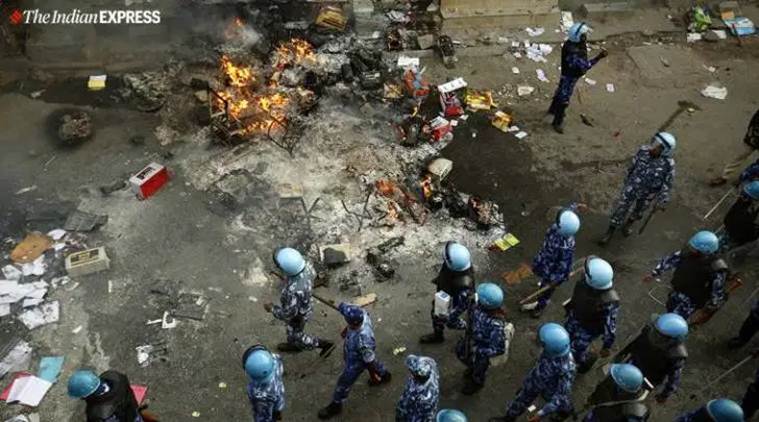On Thursday, Khamenei, who has been Iran’s spiritual leader since 1989, tweeted: “The hearts of Muslims all over the world are grieving over the massacre of Muslims in India. The govt of India should confront extremist Hindus & their parties & stop the massacre of Muslims in order to prevent India’s isolation from the world of Islam.”

He concluded the tweet with a hashtag: #IndianMuslimslnDanger.
Story continues below this ad
On Monday night, Zarif’s tweet made Iran the fourth Muslim-majority country to officially react to the riots. A day later, India summoned the Iranian Ambassador in New Delhi, Ali Chegeni, and lodged a “strong protest” against, what it called, “unwarranted” remarks by the Minister.
Zarif had tweeted: “Iran condemns the wave of organised violence against Indian Muslims. For centuries, Iran has been a friend of India. We urge Indian authorities to ensure the wellbeing of ALL Indians & not let senseless thuggery prevail. Path forward lies in peaceful dialogue and rule of law.”
Responding to Zarif’s comments, Ministry of External Affairs spokesperson Raveesh Kumar said that it was conveyed to the Ambassador that “selective and tendentious characterisation of recent events in Delhi are not acceptable”.
On Thursday, minutes before Khamenei’s tweet, the MEA spokesperson had responded to adverse comments made by UK’s Junior Foreign Minister Nigel Adams and Turkish President Recep Tayyip Erdogan.
Story continues below this ad
“We have seen certain comments made on the recent incidents of violence in Delhi. At this stage, we would like to highlight that the situation is fast returning to normal. The law enforcement agencies are on the ground to restore confidence and ensure that law and order is maintained,” Kumar said.
“The Prime Minister has appealed for peace and brotherhood. Senior officials have visited the place of violence, peace committees have been formed and other steps have been taken in this direction. At this sensitive time, we would urge people not to make any irresponsible comments and not to be influenced by selective and unsubstantiated narrative on the matter,” he said.
“As far as comments by the Turkish President are concerned, they are factually inaccurate and are driven by his political agenda. We do not expect such irresponsible statements from a Head of State. On March 3, we made a strong demarche on the matter with the Turkish Ambassador in Delhi,” Kumar said.
Much is at stake on the strategic front for India in its bilateral ties with Iran, particularly with the US signing a peace deal with the Taliban in Afghanistan. Iran is critical for two specific reasons: it meets part of India’s energy needs and lends access to Afghanistan through the Chabahar port.
Story continues below this ad
Tehran had last criticised India after the 2002 Gujarat riots and, a decade earlier, after the 1992 Babri Masjid demolition. India had earlier rejected comments from Turkey, Malaysia and Pakistan, which had spoken out against the riots over the last week.
The recent comments have come after six years of the government’s outreach to the Islamic world and building diplomatic relationships, especially in West Asia. Iran has been one of the countries with which New Delhi has proactively engaged in the last few years.

 Khamenei concluded the tweet with a hashtag: #IndianMuslimslnDanger.(Express photo: Praveen Khanna/File)
Khamenei concluded the tweet with a hashtag: #IndianMuslimslnDanger.(Express photo: Praveen Khanna/File)





